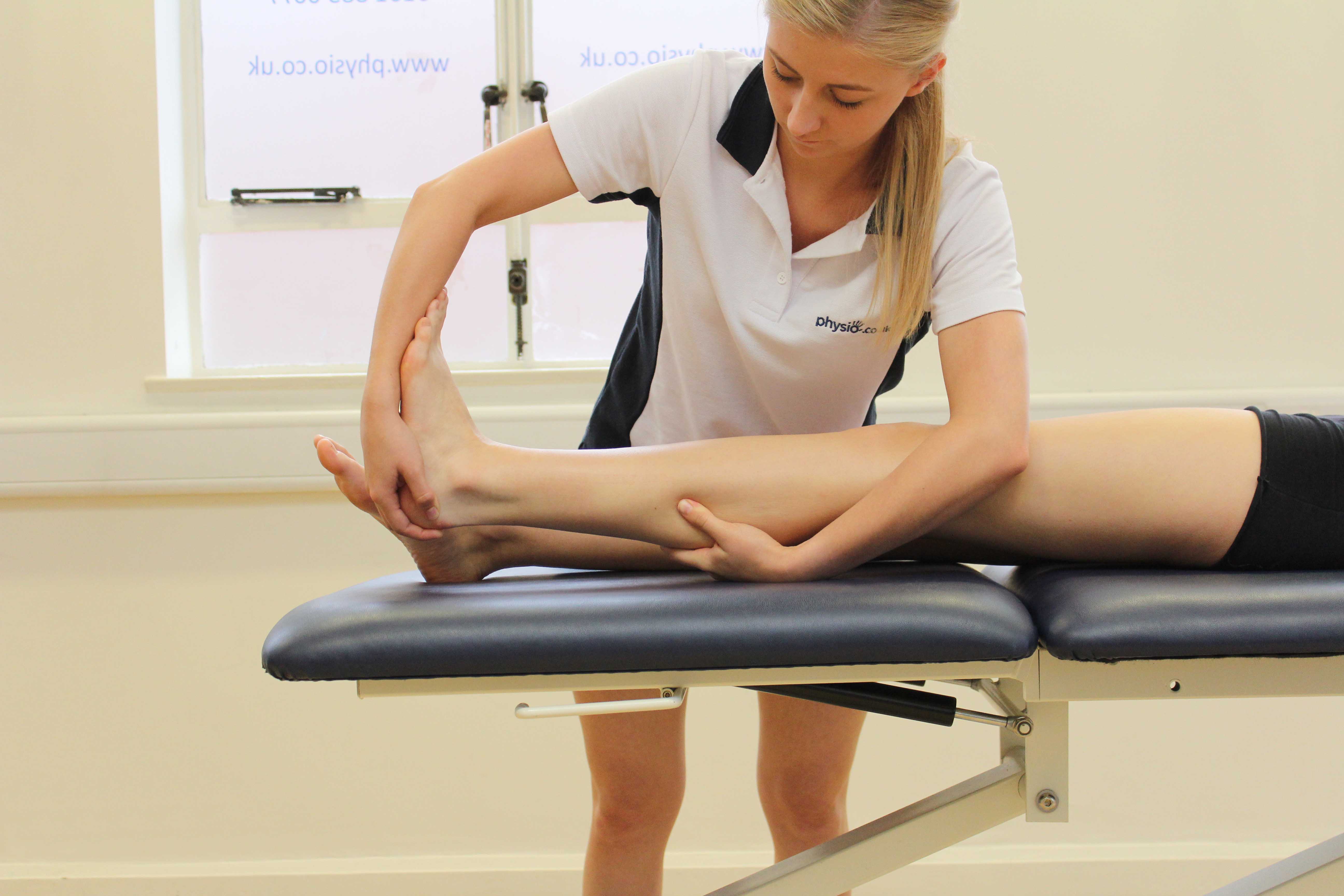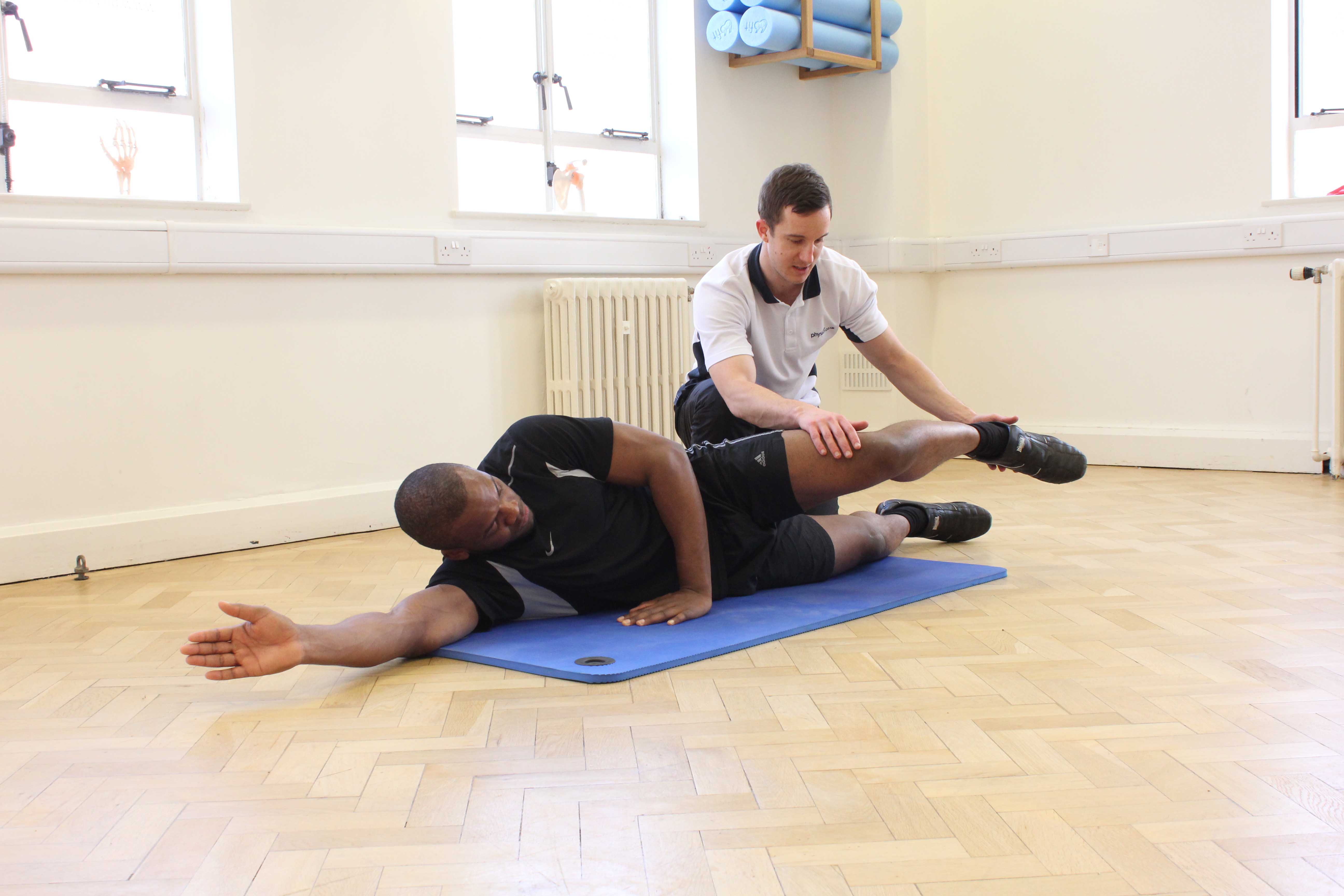What is sciatica?
Sciatica is pain or altered sensation in the sciatic nerve.
Sciatica is not a problem on its own. Sciatica happens as a result of another problem that affects the sciatic nerve. The sciatic nerve starts in the spine and runs down the back of each leg so there are a number of problems that can affect the nerve and create symptoms known as sciatica.

Above: beating percussion massage applied to the hamstrings by specialist therapist
How does sciatica happen?
Sciatica is the result of damage to the sciatic nerve or damage to another part of the body that creates pressure on the sciatic nerve. Due to the length of the nerve there are several possible causes of sciatica. These can include:
- Slipped disc
- Degenerative disc disease
- Piriformis syndrome
- Spinal stenosis
- Pelvic injury or fracture
- Tumour

Above: Soft tissue massage of the hamstring muscles by a specialist MSK therapist
What are the symptoms of sciatica?
Sciatica can have different symptoms and pain can vary from person to person. Symptoms can include:
- Pain
- Burning sensation
- Numbness
- Tingling
- Pins and needles
- Weakness
- Dull ache
Pain usually starts gradually but can range from mild to severe and is usually felt in one leg. Pain can be exacerbated:
- By walking long distance
- After sitting or standing for long periods
- By coughing or sneezing
- By bending backwards
- At night

Above: Soft tissue massage of the quadricep muscles by a specialist MSK therapist
o">Above: Trigger point massage of the quadriceps muscles by experienced MSK therapist
What should I do if I have sciatica?
If you have or suspect you have sciatica, you should consult a physiotherapist as it is result of another problem that will need to be diagnosed and treated. For the first 2-3 days try applying ice to the back of the leg using a bag of frozen peas or crushed ice wrapped in a damp cloth for 15–20 minutes over the back of the leg every 1–2 hours. After 2-3 days, if this has not reduced symptoms, try applying heat to the back of the leg using a hot water bottle or heat pack. This can be done as often and as long as necessary as long as the skin is not being burnt.
At night, try sleeping in a fetal position with a pillow between your legs or, if you lie on your back, sleep with a pillow under your knees. These positions are designed to try and reduce pressure on the sciatic nerve and relieve symptoms. These measures may relieve symptoms but there is still an underlying problem causing the sciatic pain, so a physiotherapy assessment is still needed.

Above: Soft tissue massage of the quadricep muscles by a specialist MSK therapist
What shouldn’t I do if I have sciatica?
If you have or suspect you have sciatica, you should try to avoid activities that make the pain worse such as walking long distances or sitting for long periods of time.
Physiotherapy treatment for sciatica.
Physiotherapy will be aimed at treating and diagnosing the problem causing the sciatica. Treatment will vary due to the different possible causes. There are treatment techniques specifically for the sciatica symptoms though. These may involve:
- Nerve slider exercises
- Gentle stretching exercises
- Education to reduce pain
- Education for possible future re-occurrence
Could there be any long-term effects from sciatica?
The possibility of long term effects would depend on the cause of the sciatica. If the problem can be effectively treated then the sciatica symptoms should stop. However the cause of the sciatica could be a long term back problem in which case the symptoms may persist and physiotherapy treatment would include education about long term management.
Please call Physio.co.uk on
0330 088 7800 to arrange an appointment or
book online today.
 Above: beating percussion massage applied to the hamstrings by specialist therapist
Above: beating percussion massage applied to the hamstrings by specialist therapist Above: Soft tissue massage of the hamstring muscles by a specialist MSK therapist
Above: Soft tissue massage of the hamstring muscles by a specialist MSK therapist Above: Soft tissue massage of the quadricep muscles by a specialist MSK therapist
Above: Soft tissue massage of the quadricep muscles by a specialist MSK therapist
 0330 088 7800
0330 088 7800



 Above: Soft tissue massage of the quadricep muscles by a specialist MSK therapist
Above: Soft tissue massage of the quadricep muscles by a specialist MSK therapist






























